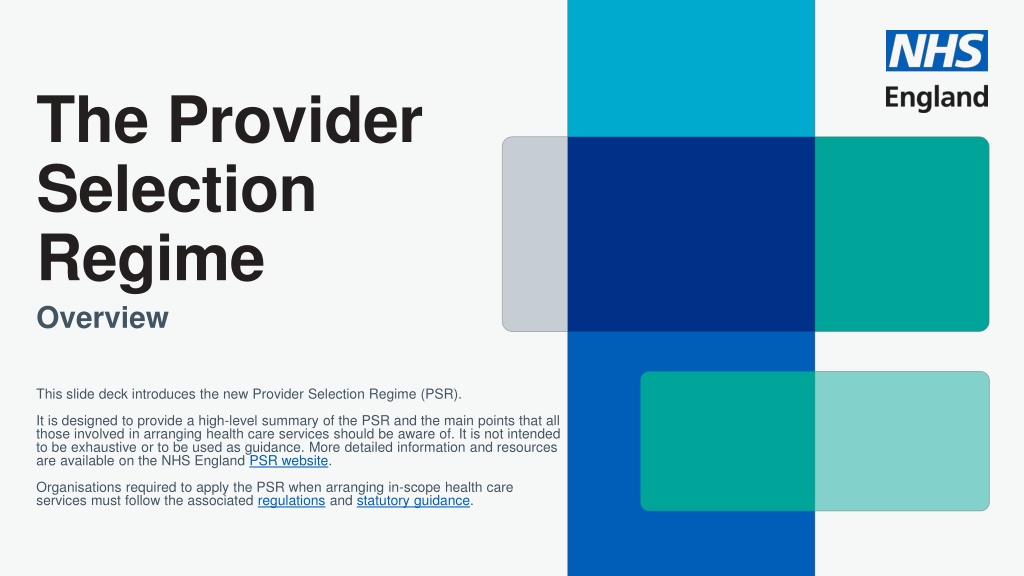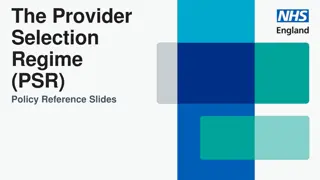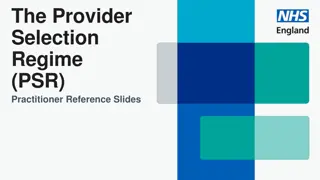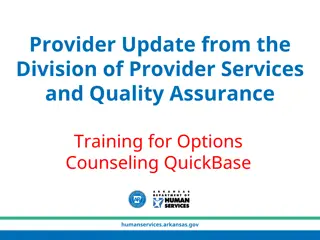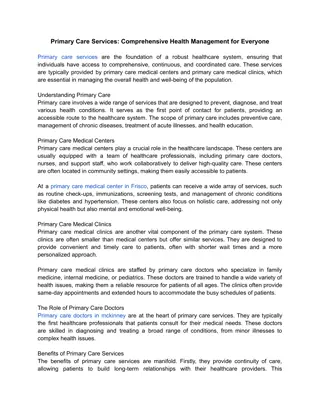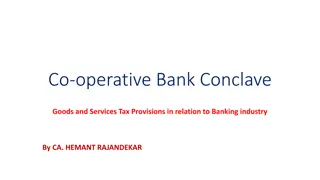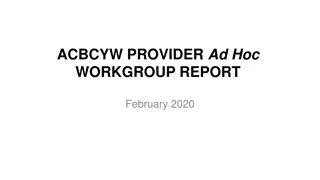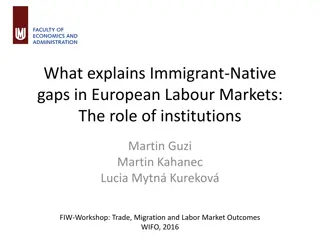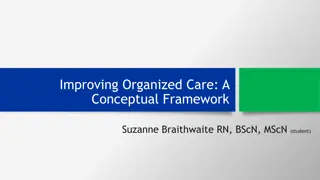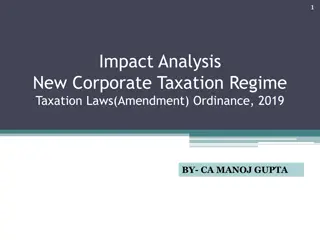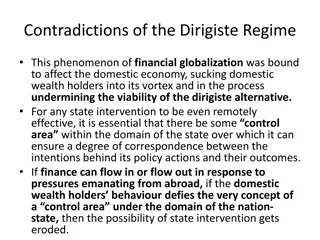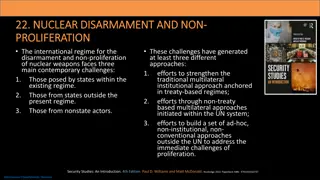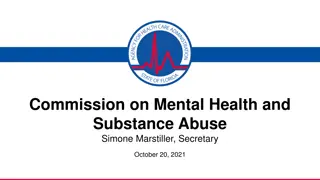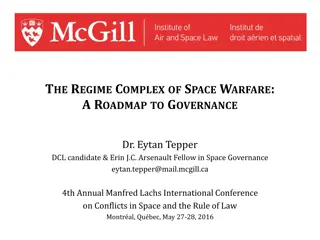Introducing the Provider Selection Regime (PSR) in Health Care Services
The Provider Selection Regime (PSR) is a new set of rules under the Health and Care Act 2022 for procuring health care services in England. It aims to promote greater integration of health and care services by removing them from the scope of previous regulations. Relevant authorities like NHS England and local authorities must follow the PSR when procuring healthcare services, and resources are available to support the transition. Changes aim to increase flexibility in commissioning decisions for better service alignment with patient needs.
Download Presentation

Please find below an Image/Link to download the presentation.
The content on the website is provided AS IS for your information and personal use only. It may not be sold, licensed, or shared on other websites without obtaining consent from the author. Download presentation by click this link. If you encounter any issues during the download, it is possible that the publisher has removed the file from their server.
E N D
Presentation Transcript
The Provider Selection Regime Overview This slide deck introduces the new Provider Selection Regime (PSR). It is designed to provide a high-level summary of the PSR and the main points that all those involved in arranging health care services should be aware of. It is not intended to be exhaustive or to be used as guidance. More detailed information and resources are available on the NHS England PSR website. Organisations required to apply the PSR when arranging in-scope health care services must follow the associated regulations and statutory guidance.
Executive Summary The Provider Selection Regime (PSR) is a set of new rules that relevant authorities must follow when procuring health care services in England. The PSR was created under the Health and Care Act 2022, as part of wider measures to promote greater integration of health and care services. The PSR came into force on 1 January 2024. The procurement of health care services by relevant authorities has been removed from the scope of the Public Contracts Regulations 2015, and the NHS Procurement, Patient Choice and Competition Regulations 2013 will be revoked. The relevant authorities required to follow the PSR when procuring healthcare services are NHS England, integrated care boards, NHS trusts and NHS foundation trusts, and local authorities or combined authorities. Relevant authorities should familiarise themselves with the PSR regulations and NHS England s draft statutory guidance and review their procurement and governance processes in line with this. A PSR toolkit has been produced to support relevant authorities to prepare for and apply the new regime. A series of webinars are running until March 2024. These resources can be accessed via the NHS England PSR website. 2
Changes to health care services commissioning Previous legislation governing the commissioning and procurement of health care services set the expectation that competitive tendering is used to award health care contracts. This created barriers to integrating care and disrupted the development of stable collaborations. Since 2019 NHS England has iteratively co-created a new set of proposals with ICBs, NHS trusts and foundation trusts, commissioning support units, local authorities, government departments and key membership bodies, to introduce a new provider selection regime that supports the wider integration agenda. We ve heard how the health care provided to patients would benefit from increased flexibility in commissioning decisions, where competitive tendering is a tool that the NHS can choose to use from a wider set of options where it is appropriate to secure services that meet the needs of the people. 3
Context for the new legislation The Health and Care Act 2022 (the 2022 Act) codified the move towards more integrated working across the health and care systems, so that all decisions taken by commissioners and providers are in the best interest of patients and service users. As part of the necessary reforms to achieve its aim, the 2022 Act introduced a new regime for selecting providers of health care services in England: the Provider Selection Regime (the PSR ). The Health Care Services (Provider Selection Regime) Regulations 2023 sets out the detail of the PSR. Relevant authorities must also have regard to the associated statutory guidance. The PSR came into force on the 1 January 2024 and replaced the: Public Contracts Regulations 2015, when procuring health care services National Health Service (Procurement, Patient Choice and Competition) Regulations 2013. 4
Key points of the PSR In line with the provisions in the Health and Care Act 2022, the PSR: introduces a flexible and proportionate process for deciding who should provide health care services provides a framework that allows collaboration across systems ensures that all decisions are made in the best interest of patients and service users. The PSR requires organisations to: act transparently, fairly, and proportionately act with a view to secure the needs of the people who use the services improve the quality of the services improve the efficiency of the services - including through integrated service delivery. 5
Scope of the new legislation Organisations (termed 'relevant authorities ) required to follow the PSR when procuring health care services are: NHS England Integrated Care Boards NHS trusts and foundation trusts Local authorities or combined authorities In scope are: health care services arranged by the NHS e.g., hospital, community, mental health, primary health care services public health services arranged by local authorities e.g., substance use, sexual and reproductive health, and health visitors Out of scope are: goods e.g., medicines, medical equipment social care services Non-health care services or health- adjacent services e.g., capital works, business consultancy 6
Overview of the provider selection processes Relevant authorities can follow the below provider selection processes to award contracts for health care services: Direct award process A wherethere is an existing provider for the services and that provider is the only capable provider. Direct award process B wherepeople have a choice of providers, and the number of providers is not restricted by the relevant authority. Direct award process C where there is an existing provider for the services and that existing provider is satisfying the original contract and will likely satisfy the proposed new contract, and the services are not changing considerably. Most suitable provider process wherethe relevant authority is able to identify the most suitable provider without running a competitive process. Competitive process where the relevant authority wishes to run a competitive exercise, or if they wish to conclude a framework agreement. 7
Key criteria There are five key criteria that must be considered when assessing providers under direct award process C, the most suitable provider process, or the competitive process. These are: Quality and innovation Value Integration, collaboration, and service sustainability Improving access, reducing health inequalities, and facilitating choice Social Value 8
Transparency and reviewing decisions during the standstill period The PSR provides for greater flexibility in deciding how best to arrange local health care services and allows relevant authorities to award contracts without using a competitive process, where appropriate. Other checks and balances are therefore in place to ensure that the PSR is complied with and that the flexibilities are used appropriately and in the best interest of patients and service users. These include: specific transparency and record-keeping requirements a standstill period within certain provider selection processes that is, a minimum period between publishing an intention to award a contract notice and awarding a contract where provider selection decisions can be reviewed an independent PSR review panel providers will be able to make representations to the PSR review panel if they believe that a relevant authority has not followed processes/met the requirements of the PSR when awarding a contract. 9
Reviewing decisions during the standstill period The standstill period applies where relevant authorities followed direct award process C, the most suitable provider process, or the competitive process. The standstill period does not apply to direct award processes A and B. During the standstill period: providers can bring representations against provider selection decisions relevant authorities have to review representations and have to make a further decision about whether to proceed with the award of the contract, return to an earlier step in the process, or abandon the process where the provider remains unsatisfied with the response of the relevant authority, they may seek a review by the independent PSR review panel the panel may accept to review a representations and offer advice to the relevant authority; the relevant authority will take a further decision based on that advice about whether to proceed with the award of the contract, return to an earlier step in the process or abandon the process. 10
Transitional provisions The PSR came into force on 1 January 2024. Where relevant authorities started a contract award process before 1 January 2024 using the Public Contracts Regulations 2015 (PCR), then they must conclude that process under the PCR rules. Where relevant authorities start a contract award process on or after 1 January 2024, then they must apply the PSR even where awarding a contract based on a framework agreement that was established under the PCR rules. Any contract modifications on or after the 1 January 2024 must be carried out using the PSR, even if the original contract was awarded under the PCR rules. 11
Contract award procedures started before commencement A contract award process is considered to have started under the Public Contracts Regulations 2015 if any of the following occur before the PSR comes into forces: a contract notice has been submitted to the UK e-notification service for publication in accordance with Regulation 51(1) of the Public Contracts Regulations 2015 the relevant authority has contacted any provider to seek expressions of interest or offers in respect of a proposed contract the relevant authority has contacted any provider to respond to an unsolicited expression of interest or offer received from that provider in relation to a proposed contract. 12
Implementation NHS England s statutory guidance sets out what relevant authorities must do to comply with the PSR legislation. Relevant authorities must have regard to the statutory guidance. NHS England has also published a range of tools to help relevant authorities prepare for implementation. These include: process maps (one for each decision-making process) comprehensive FAQs Find A Tender Service (FTS) guide a series of webinars and associated slide decks to provide an overview for commissioners and an in-depth look at the PSR for practitioners These are available on the PSR website. 13
